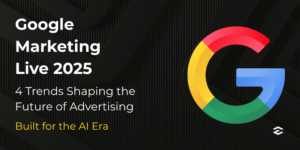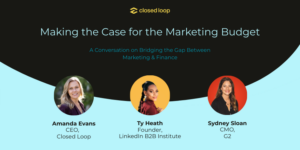
Google Marketing Live 2025: 4 Trends Advertisers Must Know
Google is doubling down on AI-first advertising strategies in 2025. Here are the four trends from Google Marketing Live that advertisers must act on.

Image source: vanillabearfilms/Unsplash
Whether you’ve avoided investing in video or you aren’t sure where to start, now is the time to prioritize this content format. For B2B digital advertisers, video is no longer optional. Instead, it should be the foundation of your full-funnel ad strategy.
From keeping your brand top-of-mind to generating qualified leads, video is essential for achieving key goals. Below, we’ll cover why B2B advertisers need a video-first content strategy, including expert insights from Jeremy Olson, Closed Loop’s SVP of Creative Strategy.
Between images, videos and text, which format would you guess is best at driving purchase decisions? Although image- and text-based content play a part, B2B buyers overwhelmingly prefer video.
A survey of 300 B2B buyers found that a whopping 95% consider video important throughout the decision-making process. While video can certainly drive conversions, it’s just as useful at the problem awareness, information gathering and even post-purchase stages.
It’s a matter of convenience. Video tends to convey information more efficiently, making this format more attractive to busy B2B buyers who have a lot of data to process.
At any given moment, only a small fraction of your target audience is in-market, meaning they’re actively considering a purchase. The rest of your potential buyers are out-market, not yet ready to buy.
In fact, the 95-5 rule suggests that just 5% of potential buyers are currently in-market. But this doesn’t mean you should wait until the remaining 95% of your target audience is ready to buy before attempting to connect with them.
Instead, focus on creating memorable category entry points for your target audience. In other words, publish content that aligns your brand with your audience’s use cases. This way, your solution will more likely be top of mind when potential buyers are in-market.
Aim to create more than one category entry point for potential buyers. In doing so, you’ll build better brand awareness and create stronger and more relevant memories for your target buyer.
Keep in mind that B2B buyers prefer video content during this initial stage of the buying process. However, not just any type of video will drive optimal results. Olson shares, “At Closed Loop, we’ve found that longer-form videos like testimonials, brand videos and edutainment are effective for awareness, consideration and affinity.”
From software to equipment to professional services, B2B solutions aren’t always straightforward. To explain the many features and benefits these products and services offer, businesses often rely on dense, information-packed content.
Yet B2B buyers prefer video over formats like research reports and whitepapers. According to the B2B buyer study, 70% view video as the best format for driving awareness of business problems.
“B2B marketers typically promote complex products or solutions that are difficult to convey with static ads,” Olson explains “As a result, video ads tend to be more captivating—and they also help the target audience unpack the brand’s value proposition.”
Take this YouTube ad by RingCentral for example. In under 90 seconds, the video ad introduces various use cases for the communication platform. It features several testimonials, allowing existing customers to share challenges and solutions in a way that’s likely to resonate with prospects.
B2B solutions typically solve costly business problems. As a result, buyers often feel pressure to purchase the right product or service for their team, requiring both thorough research and a leap of faith.
One way to establish credibility and get buyers to trust your business is to make your brand more relatable. Over 90% of B2B buyers believe video is essential for building trust in a brand, according to the survey.
It’s easy to see why. Videos help B2B marketers tell their stories, which is important so they don’t come across as austere, faceless corporations. These stories can cover everything from the brand’s origin to its mission and values to human interest topics.
Producing compelling video marketing content isn’t as difficult as it might seem. “When you partner with Closed Loop, you get access to high-end video production and 10+ years of experience with B2B video content,” Olson explains. “This means you can avoid relying on stock footage and start creating custom videography.”
“In a single day of filming, our team captures enough footage to fill an entire digital marketing pipeline (100+ assets). We also have a top-notch team of 3D animators and motion graphic designers who know how to bring B2B products to life.”
On the surface, B2B decision-making may look like a calculated process that relies mainly on crunching numbers. But like any buying process, emotions often influence B2B purchases.
Compared to other advertising formats, video evokes the strongest emotions. Because video excels at storytelling and conveys creativity, it has the power to sway viewer sentiment and outperform static ads.
While high production values often result in better ads, there’s also a time and a place for simpler video content. Wistia’s State of Video Report suggests that low-budget talking head videos can also perform well with certain advertising audiences.
In some cases, partnering with B2B influencers or sourcing user-generated content (UGC) is a smart way to fuel your ad content pipeline. For instance, B2B creator Farbsy produced the Instagram reel below for Scribe via a paid partnership. Scribe then promoted the video asset across Meta platforms to share multiple use cases likely to resonate with B2B buyers.
A successful B2B video strategy can do much more than get your business on prospects’ radar. When done right, video content can also generate leads and drive conversions.
While longer, more in-depth videos often work best at the awareness stage, shorter videos tend to be ideal for middle- and bottom-of-funnel objectives. “Generally speaking, microvideos under 15 seconds are best practice with LinkedIn and Meta ads intended for website traffic or lead generation,” Olson advises.
When you create video content for leads and conversions, don’t stop with a single ad. Instead, experiment with different versions and iterate on your top-performing ads.
Olson recommends making simple yet significant changes to video creatives. ”Test changes to the video length, ad copy, offer, footage type or call to action (CTA). And always adjust one variable at a time to get meaningful insights,” he suggests.
For example, Calm ran the video ads below on networks like YouTube and LinkedIn. They represent just two of many versions of the same ad.
All include the same ad copy and closing video clip. But each ad uses a different video intro to appeal to the target audience in various ways.
For B2B advertisers, video should never be an afterthought. With a video-first marketing strategy, you can engage B2B buyers at every step of their purchasing process and drive meaningful results at each stage of the funnel.
Not sure how to begin? We’re here to help. Contact Closed Loop to learn more about our video production and performance creative offerings.

Google is doubling down on AI-first advertising strategies in 2025. Here are the four trends from Google Marketing Live that advertisers must act on.

Closed Loop and Clover earned three Silver Telly Awards for the “Behind the Business” campaign, celebrating standout creative across CTV and digital.

Learn how leading CMOs are reframing marketing to speak the CFO’s language, drive predictable outcomes, and secure their budgets in 2025 and beyond.